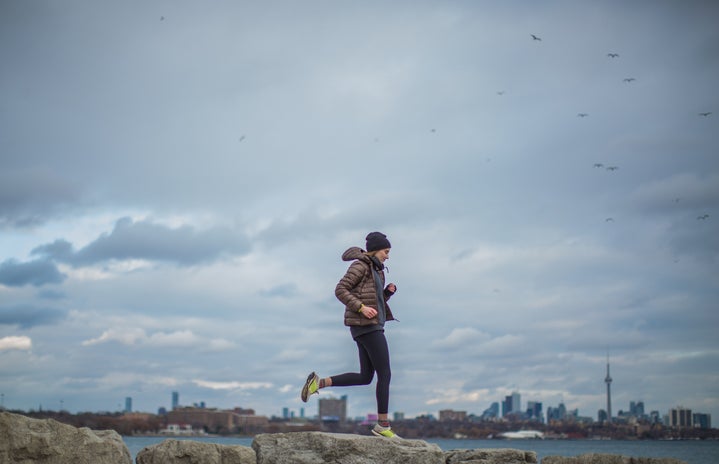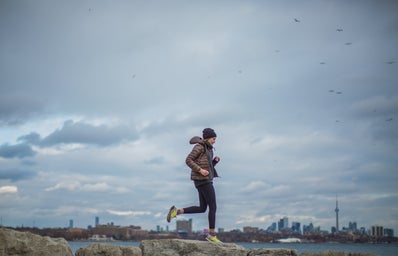I’ve never been a particularly good loser—board games, trivia, sporting events, you name it. Now, if I don’t think I can win something, I don’t even participate. A fault, I know, but one to which I own up.
Unfortunately, losing weight falls along the same lines for me. Dieting and working out seemed miserable because I knew that I wouldn’t lose weight quickly enough to convince me that it was working. Yet in high school, I desperately wanted to change my body. However, because I knew I couldn’t win, I refused to do anything but wallow in self-pity about my lack of options.
For those who don’t know me, I’m a fairly short and stout human being. The smallest size I’ve ever been able to wear is a six, and that was a squeeze. I don’t have a thigh gap, I’ve got that classic mother-of-two underarm flab as a twenty-year-old, and my abs are non-existent. In fact, my abs have never even appeared. Add to that a smattering of acne, glasses, uneven eyebrows and a mass of brown, bushy hair—you’ve got me.
Since I was about thirteen years old, I’ve been told by every magazine cover, doctor, and some so-called friends that I could stand to lose weight or eat healthier or change myself in a variety of ways that always made me feel very insecure.
In some ways, they’re right. I could stand to eat a few more fruits and veggies, fewer carbs, and less sugars. It wouldn’t kill me to venture to the gym once or twice a week; in fact, it might improve my heart health and boost my confidence (I mean, thousands of scientists can’t be lying about the endorphin release, right?). Realistically, I know all that, and I appreciate that my friends and family voice their concerns in terms of my health rather than my beauty. So, you might ask, what’s stopping me?
Firstly (and perhaps superficially), I have activity and allergy-induced asthma, which means that regardless of season, time, or activity, I will probably not be able to breathe by the end of it. To be honest, walking from the NCAs to Old Kenyon winds me unless I walk at a snail’s pace and the temperature ranges from 50-70 degrees. I literally can’t make it up the KAC hill without a few breaks, and even then, I have to use my inhaler right afterwards, or I can faint from lack of oxygen. So activities such as running, Zumba or lifting weights, unless I want to put myself through some exceptional trouble, are out.
Secondly, I am terrified to lose the game of dieting and working out—or, maybe, I am terrified to win. I watched girls in high school and college fall prey to the dangerous game of counting calories. I am a control freak and I worry that if I even start to pay attention to things such as carbs, sugars, and amount of steps taken per day, my entire life will be consumed by the balancing act. I never wanted to be the girl who wouldn’t eat ice cream with her friends because I’d reached my allotted calories or didn’t run seven miles yesterday.
I don’t lose games, and this would not have been different. I would have won, lost the most weight, counted the most calories, whatever it took—and made myself very sick and unhappy in the process. So, I avoided and took the opposite route, which wasn’t healthy either.
Instead of counting calories, I was suddenly hoarding them, proudly finishing entire pizzas by myself just to prove to the world that I wasn’t obsessed with my body. This was also making me sick, and I had to wean myself back to eating normal amounts of food.
Third, and most importantly, I am concerned (and sometimes convinced) that if I lose weight, I lose something else—a unique and individual identity that I’ve worked very hard to maintain in the face of a thousand skinny models and body-con dresses and skinny jeans and magazines screaming about ways to maintain the perfect “summer bod.”
Losing weight and eating healthier always felt like losing to a larger societal pressure, one that I had been fighting my entire life: the pressure to change and morph to meet someone else’s desires, and most often, a male desire. If I lost weight, then I was admitting that society was right—that I wasn’t beautiful. Like I said, I don’t lose, and admitting someone else is right is just a polite way of losing.
I was worried that if I lost even a pound, or suddenly became a salad-eater or gym-goer, not only would it provoke commentary from my friends and family, but that I would change into a different person entirely. I did not want to suddenly have new friends or romantic interests just because I had lost weight—I did not want anyone that shallow to enter into my life. I wanted to be me, in all my glory, and I was afraid that losing weight (which I occasionally hold so dear) would change me entirely.
It has taken years to build up my confidence. I was a senior in high school before I even considered leaving for school without any makeup on. Often, one comment can shatter it because I was never regarded as conventionally beautiful (i.e, skinny).
This is not to say that skinny girls don’t suffer their share of societal shaming—there’s plenty of criticism directed at every girl—but I felt that my battle was particularly difficult because very few public figures ever looked like me. If there’s anyone disagreeing with me, imagine that you’ve gone shopping with your friends, and they start to make fun of size ten leggings by shoving all of their hands in the pant hole without knowing that you are currently wearing the same pair and size of said leggings. Yep, that’s the feeling.
It’s difficult to go through high school looking like the “before” and not the “after” in every magazine, teen movie, book and weight-loss pill commercial. It’s why I’m so disgusted by books like The DUFF, which advertise a positive side to comments that hurt me and others throughout our lives. However, I managed it and so did lots of others girls (and people of all genders, for that matter), and we’re stronger for it. The trouble is my built-up confidence hasn’t totally eradicated my vapid streak. I’m still obsessed with my body—how I look and how I’m perceived by others. Most of us are because we’re constantly told that we need to be.
My fears about losing weight are not anywhere close to being eradicated. At the same time, I realize that I need to make some strides for the health of my body. I don’t want to change myself, but I don’t want to let the fear of change keep me from being healthy.
So for now, I’m working on maintaining a homeostasis of weight and of health, which should be way more important than any number on a scale. I try to maintain my current weight, making sure I can fit into pants from my senior year of high school and not going overboard on Christmas cookies, but still eating what I want when I want. I drink more water and occasionally will pop a piece of fruit into my mouth, but only if I feel like it. I go on walks with friends around campus, even if they’re more leisurely than a workout probably should be. I don’t count steps, but the amount of laughter shared each day.
Somedays I really like my body and other days, I don’t—just like everyone else on the planet. I’m just refuse to lose weight or sleep over it. As long as I can confidently do cartwheels, I’m healthy enough for me, and that’s all that really matters.
Image Credit: Regan Hewitt


